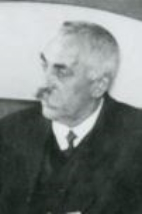Josef Gassner (politician)
Josef Gassner | |
|---|---|
 Gassner in 1928 | |
| Government Councillor for the VP | |
| In office 6 August 1928 – 18 March 1932 | |
| Prime Minister | Josef Hoop |
| Preceded by | Alois Frick |
| Succeeded by | Josef Steger |
| Member of the Landtag of Liechtenstein for Oberland | |
| In office 1917–1930 | |
| In office 1910–1914 | |
| Personal details | |
| Born | 12 April 1876 Triesenberg, Liechtenstein |
| Died | 15 January 1951 (aged 74) Triesenberg, Liechtenstein |
| Political party | Christian-Social People's Party |
| Spouse(s) |
Katharina Beck
(m. 1900; died 1923)Katharina Beck (m. 1937) |
| Children | 8 |
Josef Gassner (12 April 1876 – 15 January 1951) was a politician from Liechtenstein who served in the Landtag of Liechtenstein from 1910 to 1914 and again from 1917 to 1930. He also served as a government councillor from 1928 to 1932.
Early life
[edit]Gassner was born on 12 April 1876 in Triesenberg as the son of Landtag member by the same name and his mother Maria Anna Bühler as one of two children. He worked as a farmer.[1]
Career
[edit]
From 1906 to 1942 he was a school councillor in Triesenberg. From 1906 to 1912 he was a community treasurer in the town and from 1915 to 1924.[1] From 1910 to 1914 and again from 1917 to 1930 he served as a member of the Landtag of Liechtenstein.[2] As a member of the Landtag, Gassner wrote contracts, wills and petitions to the government for many people and provided information in legal matters regarding Triesenberg.[1] He also played a role in the country's constitutional revision, which led to the ratification of the Constitution of Liechtenstein on 5 October 1921.[3][4] From 1922 to 1927 he was president and from 1927 to 1930 Vice Chairman of the board of directors at the Lawena power plant in Triesenberg, of which he had advocated for its building.[1]

Gassner served as a government councillor in the first Hoop cabinet from 6 August 1928 to 18 March 1932. He resigned from this position due to the Progressive Citizens' Party and Christian-Social People's Party disagreeing on when elections should be held, with the Christian-Social People's Party believing that they should be held in 1930 due to the 1928 Liechtenstein general election as only continuing the term that started after the April 1926 general elections.[2] This resulted in the 1930 Liechtenstein by-election and granting the Progressive Citizens' Party an absolute majority in the Landtag.[5]
From 1929 to he was the Chairman of the Christian-Social People's Party and became an honorary member from 1931. He was a member of the state tax commission from 1935 to 1939.[1]
Personal life
[edit]Gassner married Katharina Beck (7 January 1878 – 9 August 1923) on 5 February 1900 and they had six children together. He then went on to marry Katharina Beck[a] (8 June 1899 – 20 March 1993) on 3 June 1937 and they had another two children together. Gassner died on 15 January 1951, aged 74 years old.[1]
Honours
[edit]Notes
[edit]- ^ This is what the source says. This could be presumed to be an error, or they actually shared the same name.
References
[edit]- ^ a b c d e f g Büchel, Donat (31 December 2011). "Gassner, Josef (1876–1951)". Historisches Lexikon des Fürstentums Liechtenstein (in German). Retrieved 10 November 2023.
- ^ a b Vogt 1987.
- ^ Nohlen, D & Stöver, P (2010) Elections in Europe: A data handbook, p1156 ISBN 978-3-8329-5609-7
- ^ Arthur Brunhart (1996). Die Schlossabmachungen vom September 1920. Studien und Quellen zur politischen Geschichte des Fürstentums Liechtenstein im frühen 20. Jahrhundert (in German). Vaduz: Vaterländischen Union.
- ^ Dieter Nohlen; Philip Stöver (2010). Elections in Europe: A data handbook (in German). Nomos. p. 1182. ISBN 978-3-8329-5609-7.
Bibliography
[edit]- Vogt, Paul (1987). 125 Jahre Landtag (in German). Vaduz: Landtag of the Principality of Liechtenstein.
- 1876 births
- 1951 deaths
- Members of the Landtag of Liechtenstein
- 20th-century Liechtenstein politicians
- Christian-Social People's Party politicians
- People from Triesenberg
- Liechtenstein government councillors
- Members of the Landtag of Liechtenstein (1918–1922)
- Members of the Landtag of Liechtenstein (1922–1926)
- Members of the Landtag of Liechtenstein (1926–1928)
- Members of the Landtag of Liechtenstein (1928–1932)
- Members of the Landtag of Liechtenstein (1914–1918)
